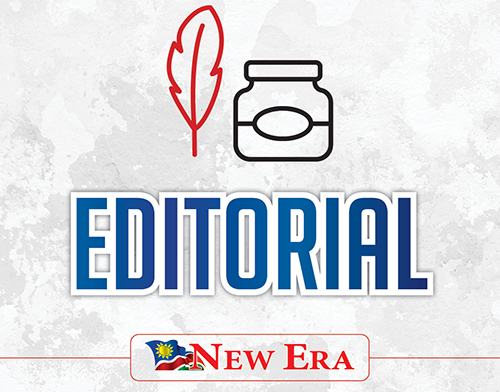“I don’t do politics,” is a common phrase thrown around by young people in Namibia.
“Politics is for old people,” is another screamer among many.
It is a travesty, to say the least, that most young Namibians have given up politics, and see it as a platform for the elderly.
It should worry us all that in Africa, generally, Namibia in particular, young people constitute a significant majority of the electorate, but do not vote.
Their participation in active politics is very low, as the greater majority have elected to sit on the fence, taking a wait-and-see approach, waiting for the future to unfold before them, instead of dictating the type of future they see fit by participation at all levels.
But here is the harsh reality: Whether young people do politics or leave it to those in the twilight of their lives, politics will still do them, regardless.
We say this in the context of the upcoming Presidential and National Assembly elections slated for November.
It is a well-known fact that voter turnout has been on the decline since 1989.
That year, close to 700 000 eligible voters exercised their democratic right in a vote that catapulted Swapo to power and Founding President Sam Nujoma to the highest office in the land – the Presidency – ushering in the post-apartheid era.
The Electoral Commission of Namibia’s 2022/2023 annual report shows a growth in the voting age population in Namibia, with 1 348 532 eligible registered voters, of whom only 370 826 are registered for the local authority elections.
The reports reveal further that for the Presidential and National Assembly elections, voter turnout declined from 97% in 1989 to 61% in 2019. As for the Regional Council and Local Authority elections, voter turnout has dropped below 50% from 81% and 82%, respectively, in 1992, to 38% and 43% in 2020.
If ever there was a time to drastically change the status quo, it is now.
The announcement by the Namibia
Statistics Agency (NSA) this week that Namibia’s population of three million is mainly composed of 2.1 million young people equates to 71.1% of the entire populace. This is the age group between 0-35 years.
Although a detailed report on the Housing and Population Census (HPC) is on the way, the preliminary figures inform us that the youth constitute the largest voting block among the various demographic groups, as Namibians under the age of 40 are expected to make up more than 60% of the eligible voting population.
Youth and young people are usually considered between the ages of 18-35.
So, the 2.1 million is not just a statistic, but warm bodies of young men and women with talent and energy who can engage constructively in the electoral process to give the country the political, economic and social direction of their choice.
In essence, Namibia is pinning her hopes on youth voters and young politicians to stand up and be counted at this year’s polls, be it on political parties’ parliamentary lists, in long queues braving the unforgiving November heat, the voting booths, or even on the ballot paper. Just be counted, young people, it does not matter where on the electoral food chain.
It is encouraging that with about eight months to go, youth leaders from various political parties have vowed to redouble their efforts to go on a serious civic and voter education crusade to address voter apathy, ensuring that young people and voters in general execute their civic duty.
Political parties’ youth wings, which have in recent years been reduced to mere lapdogs of their paymasters or singing for their supper to please those in charge of the mother bodies, it is also time to wake up from their slumber and take bread and butter issues with the seriousness they warrant.
Although it is an unpopular statement, those who conveniently choose not to participate in the electoral process effectively relinquish their right to complain about the affairs of the country.
The government makes decisions about every aspect of our lives, from construction of roads, to hospitals and schools, industries, farming, exports and imports, taxes and rates, environmental rules and protections, workplace conditions and basic wages, and the laws that shape communities.
By voting, you voice your opinion on issues that affect you daily: From the price of basic needs such as bread, milk and fuel, to complex matters such as employment-creation, student funding, land delivery and urban housing through the representative democratic system.
To address the voting apathy question beyond November, a curveball is thrown in the court of policy and lawmakers to consider making voting compulsory.
This is not a strange phenomenon, as countries such as Australia have made voting compulsory. In such a democracy, each vote is equal, every voice is equal.
Australians believe that by voting, the voter is part of the decision; and is making a choice about how their community, state or country functions.
Not voting, therefore, means that you are relying on someone else to choose for you. Not voting also means you may be fined because voting is compulsory in Australia.
While political parties, civil society organisations, the electoral commission and the media have a civic duty to educate voters about the importance of their participation, the onus to cast that vote, acquire requisite information to make informed decisions, rests squarely on voters.
As the adage goes, “You can take a donkey to a waterhole, but you cannot force it to drink.” The same goes for voters.
All stakeholders in the lot can play their part, to the best of their ability, but ultimately, turning up on 27 November and casting the all-important vote, rests on the voters’ shoulders.
American women’s rights activist Susan B Anthony once said: “Someone struggled for your right to vote. Use it.”
Her message is true to Namibians, where thousands paid the ultimate price, through their blood, to water our freedom.
Over to you, young people!



